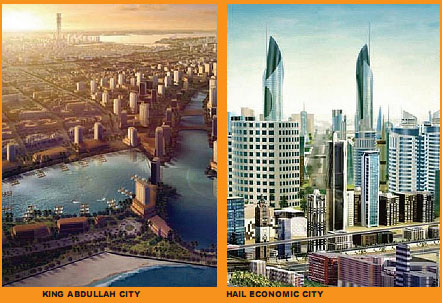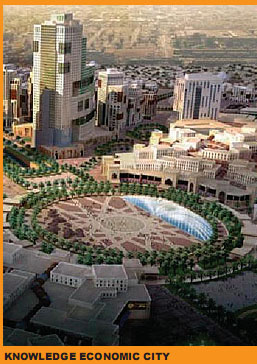
The advancement of numerous industries in the Arab world, particularly in Saudi Arabia''s steel and construction sectors, has gained unexpected growth in the past years. There is no doubt that the Middle East has become one of the top business hubs in the world with countless opportunities for foreign investors. Although most of the projects of the members of the Gulf Cooperation Council (GCC) focus on manufacturing finished products, a new trend is now directed at some investments to produce raw materials and those that cater to semiconductor industries, oil refineries and petrochemicals. Such trend is seen to increase in the next five years. Building partnerships Earlier reports claimed that many projects in steel production, either those presently operating or those firms planning to set up extension facilities are now around 97 projects. Economic analysts are saying that these companies must collaborate on what the industry wants to have, along with the provisions provided by the Arab Iron and Steel Union and the Arab steel industry as a whole in strengthening their characteristic position in distributing international statistics within countries situated in the Middle East and other neighbouring countries. The continuing efforts in the development of the Arab steel industry need not only image setting of a more stabilised position among the steel industries in the world, but more importantly in consolidation and coordination among existing firms at the Arab level. Many leaders of the steel industry stressed this call during the Arab Steel Summit 2007 constituting for the Union to establish an objective and fulfil that goal. Saudi Arabia''s prominence To shift its focus towards widening one''s horizons from simply an oil-producing economy to a more expanded non-oil market, Saudi Arabia has announced diversified plans of enriching its manufacturing, communication and construction sectors. Based on "Saudi Arabia Infrastructure Report 2009," published by Business Monitor International (BMI), the country undertakes around $300 billion investment for its future projects. Such amount is geared towards facilitating new infrastructure for the different sectors. With rising demand in the Saudi construction industry, this has contributed 5% increase in the nation''s gross domestic product (GDP) in the past few years. The report predicts this percentage rate will increase giving the Saudi construction industry a 5.2% average growth from 2008 to 2012. Boosting capital inflows Along with other economic provisions include granting foreign nationals of total ownership of properties and projects, reducing taxation for international firms and allowing them to participate in public procurement system. These activities have ensured increasing capital flows in the country. Currently, all efforts in the construction industry are being executed in the establishment of mega cities, giving priority to the building of the King Abdullah Economic City (KAEC) and Knowledge Economic City (KEC).

Although a remarkable growth in the Saudi construction industry is visible, analysts said the country should be aware of its rising inflation caused by excessive market liquidity through its prevailing budget surpluses. With political instability and the terror threats, these also pose challenges for the construction industry. In general, Saudi Arabia remains an attractive and rich spot for foreign investment despite macro-economic setbacks faced by its economy. Its construction industry is expected to make impressive developments in the years to come. In 2008, BMI forecast the Saudi construction industry to have 4.75% year - on - year growth in 2008 and to be valued in 2012 at $25.46 billion. GCC steel collaboration In relation to the global economic crises , G C C governments are urged to re - examineand l
Air Max 95 20th Anniversary The advancement of numerous industries in the Arab world, particularly in Saudi Arabia''s steel and construction sectors, has gained unexpected growth in the past years. There is no doubt that the Middle East has become one of the top business hubs in the world with countless opportunities for foreign investors. Although most of the projects of the members of the Gulf Cooperation Council (GCC) focus on manufacturing finished products, a new trend is now directed at some investments to produce raw materials and those that cater to semiconductor industries, oil refineries and petrochemicals. Such trend is seen to increase in the next five years. Building partnerships Earlier reports claimed that many projects in steel production, either those presently operating or those firms planning to set up extension facilities are now around 97 projects. Economic analysts are saying that these companies must collaborate on what the industry wants to have, along with the provisions provided by the Arab Iron and Steel Union and the Arab steel industry as a whole in strengthening their characteristic position in distributing international statistics within countries situated in the Middle East and other neighbouring countries. The continuing efforts in the development of the Arab steel industry need not only image setting of a more stabilised position among the steel industries in the world, but more importantly in consolidation and coordination among existing firms at the Arab level. Many leaders of the steel industry stressed this call during the Arab Steel Summit 2007 constituting for the Union to establish an objective and fulfil that goal. Saudi Arabia''s prominence To shift its focus towards widening one''s horizons from simply an oil-producing economy to a more expanded non-oil market, Saudi Arabia has announced diversified plans of enriching its manufacturing, communication and construction sectors. Based on "Saudi Arabia Infrastructure Report 2009," published by Business Monitor International (BMI), the country undertakes around $300 billion investment for its future projects. Such amount is geared towards facilitating new infrastructure for the different sectors. With rising demand in the Saudi construction industry, this has contributed 5% increase in the nation''s gross domestic product (GDP) in the past few years. The report predicts this percentage rate will increase giving the Saudi construction industry a 5.2% average growth from 2008 to 2012. Boosting capital inflows Along with other economic provisions include granting foreign nationals of total ownership of properties and projects, reducing taxation for international firms and allowing them to participate in public procurement system. These activities have ensured increasing capital flows in the country. Currently, all efforts in the construction industry are being executed in the establishment of mega cities, giving priority to the building of the King Abdullah Economic City (KAEC) and Knowledge Economic City (KEC).
The advancement of numerous industries in the Arab world, particularly in Saudi Arabia''s steel and construction sectors, has gained unexpected growth in the past years. There is no doubt that the Middle East has become one of the top business hubs in the world with countless opportunities for foreign investors. Although most of the projects of the members of the Gulf Cooperation Council (GCC) focus on manufacturing finished products, a new trend is now directed at some investments to produce raw materials and those that cater to semiconductor industries, oil refineries and petrochemicals. Such trend is seen to increase in the next five years. Building partnerships Earlier reports claimed that many projects in steel production, either those presently operating or those firms planning to set up extension facilities are now around 97 projects. Economic analysts are saying that these companies must collaborate on what the industry wants to have, along with the provisions provided by the Arab Iron and Steel Union and the Arab steel industry as a whole in strengthening their characteristic position in distributing international statistics within countries situated in the Middle East and other neighbouring countries. The continuing efforts in the development of the Arab steel industry need not only image setting of a more stabilised position among the steel industries in the world, but more importantly in consolidation and coordination among existing firms at the Arab level. Many leaders of the steel industry stressed this call during the Arab Steel Summit 2007 constituting for the Union to establish an objective and fulfil that goal. Saudi Arabia''s prominence To shift its focus towards widening one''s horizons from simply an oil-producing economy to a more expanded non-oil market, Saudi Arabia has announced diversified plans of enriching its manufacturing, communication and construction sectors. Based on "Saudi Arabia Infrastructure Report 2009," published by Business Monitor International (BMI), the country undertakes around $300 billion investment for its future projects. Such amount is geared towards facilitating new infrastructure for the different sectors. With rising demand in the Saudi construction industry, this has contributed 5% increase in the nation''s gross domestic product (GDP) in the past few years. The report predicts this percentage rate will increase giving the Saudi construction industry a 5.2% average growth from 2008 to 2012. Boosting capital inflows Along with other economic provisions include granting foreign nationals of total ownership of properties and projects, reducing taxation for international firms and allowing them to participate in public procurement system. These activities have ensured increasing capital flows in the country. Currently, all efforts in the construction industry are being executed in the establishment of mega cities, giving priority to the building of the King Abdullah Economic City (KAEC) and Knowledge Economic City (KEC).  Although a remarkable growth in the Saudi construction industry is visible, analysts said the country should be aware of its rising inflation caused by excessive market liquidity through its prevailing budget surpluses. With political instability and the terror threats, these also pose challenges for the construction industry. In general, Saudi Arabia remains an attractive and rich spot for foreign investment despite macro-economic setbacks faced by its economy. Its construction industry is expected to make impressive developments in the years to come. In 2008, BMI forecast the Saudi construction industry to have 4.75% year - on - year growth in 2008 and to be valued in 2012 at $25.46 billion. GCC steel collaboration In relation to the global economic crises , G C C governments are urged to re - examineand lAir Max 95 20th Anniversary
Although a remarkable growth in the Saudi construction industry is visible, analysts said the country should be aware of its rising inflation caused by excessive market liquidity through its prevailing budget surpluses. With political instability and the terror threats, these also pose challenges for the construction industry. In general, Saudi Arabia remains an attractive and rich spot for foreign investment despite macro-economic setbacks faced by its economy. Its construction industry is expected to make impressive developments in the years to come. In 2008, BMI forecast the Saudi construction industry to have 4.75% year - on - year growth in 2008 and to be valued in 2012 at $25.46 billion. GCC steel collaboration In relation to the global economic crises , G C C governments are urged to re - examineand lAir Max 95 20th Anniversary













